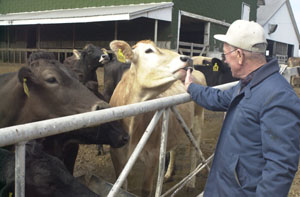By Margie Wuebker
mwuebker@dailystandard.com CARTHAGENA -- Precious Blood Brothers Don Fisher and Nick Renner welcome the return of sunny weather and warm temperatures as signs that a new planting season will get under way shortly.

After more than four decades, the two men know this year's crop of wheat, corn and soybeans will be their last.
The Missionaries of the Precious Blood Provincial Council has voted to cease farming and dairy operations at St. Charles Center effective Dec. 31. The decision ends a tradition dating back to more than 140 years ago when the Rev. Francis DeSales Brunner brought seven priests and seven brothers from Switzerland to serve German-speaking Catholics in this part of Ohio.
The brothers turned their attention to farming and raising both food and meat for seminarians and staff. At one time there were many hands to do the work, and now the numbers have dwindled to a few.
The Provincial Council initially planned to phase out all farming operations in 2008, but decided it was impractical to hire people to do the work and informed members all farming operations would end this year. Details regarding the dispersal of the dairy herd, cattle and farm equipment have not been finalized as yet. A formal celebration of thanksgiving also is in the planning stages.
Area farmers will rent the 1,100 acres of farmland located at St. Charles, the former novitiate site along state Route 118 near Burkettsville and another tract near St. Rose.
Fisher has seen many changes including the 1965 decision to merge the individual farms into one large operation. Seminarians attending St. Charles left four years later significantly reducing the workforce.
"Brother Nick and I have faced the challenge of moving away from hand work to mechanization," he says. "We achieved that goal five years ago."
Fisher, who served as farm boss until three years ago, remembers a time when small equipment was the rule rather than the exception. He recalls hooking two tractors in tandem to provide power equivalent to a larger model and climbing into the order's first cab tractor equipped with a heater but no air conditioning system. He quickly discovered how hot autumn days can get midway through plowing. An air conditioner topped the list of accessories when the vehicle was traded in later for a new model.
He terms the move to no-till farming in 1991 as the biggest change during his tenure. The brothers were among the first to pioneer the labor-saving method in the area. Now farmers are into global positioning technology, but Fisher quickly points out he and Renner only marvel at such technology from the sidelines.
Farm productivity has grown by leaps and bounds over the course of 40 years. In 1955 county agent Adrian DeBrosse challenged area farmers to produce 100 bushels of corn per acre. The brothers met the challenge handily and doubled the yield last year with 201 bushels per acre. Soybeans now average 50 to 60 bushels per acre instead of 25 -- an enviable number in bygone days. Revenue from the crops has benefited the province over the years.
"The steady increase in productivity has been amazing," Fisher says. "There was a time about 20 years ago when the farm operation ranked in the top 1 percent nationally in terms of income. We have had help from above, although I remember wondering a time or two whether he was paying attention to our prayers for rain."
The Missionaries of the Precious Blood were recognized as having one of the largest Brown Swiss dairy herds in the area. Holsteins were added to the milking operation in recent years with local resident Bill Koesters assuming the role of herdsman. Some 120 dairy cattle comprise the herd with young stock and steers adding another 150 to the census.
Fisher, who grew up on a farm near Wapakoneta, and Renner, a former farm boy from Landeck, remember a time when pigs and chickens also resided, at least temporarily, on the grounds. Large gardens and bountiful orchards once provided vegetables and fruit for seminary kitchens. After all, young men studying for the priesthood and working on the grounds certainly went through a lot of food in the course of a year.
"Since our earliest days in this country, farming has helped support the province in so many ways," Provincial Director the Rev. Angelo Anthony wrote in a letter announcing the decision to cease operation at year's end. "Though this decision closes the chapter on a long-running tradition, the values of care of the earth and stewardship of God's creation will live on through our continued presence in the area." |

